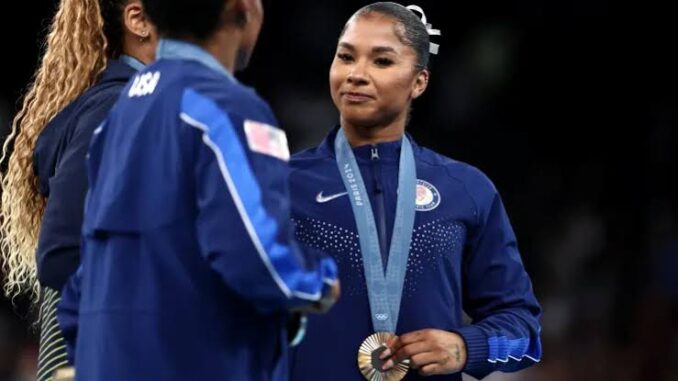
In the final moments of the Munich gold medal game in 1972, the US Olympic men’s basketball team led the Soviet Union by one point. Those three seconds were replayed three times through a disorganized series of events. For the Soviets, at least, a third attempt proved to be lucky as they emerged victorious by a single point.
For fifty-two years, the American men have declined to accept their silver medals. The International Olympic Committee has declined to reevaluate the game’s outcome, and they remain unclaimed in Lausanne, Switzerland.
The US gymnast Jordan Chiles has been asked by the IOC to return a bronze medal due to a second timekeeping error, this one lasting an entire four seconds.
As per the gymnastics regulations, an inquiry request needs to be submitted within a minute of the score being announced. The United States of America filed an inquiry regarding Chiles’ score, claiming that one of the judges’ errors in her floor exercise could be objectively verified. Chiles received the bronze medal and the investigation was maintained. The Court of Arbitration for Sport (Cas) was consulted by Romania’s gymnastics federation, claiming that their appeal was filed 64 seconds after Chiles’ score was announced. CAS concurred, and the IOC is requesting that Chiles return her allegedly fraudulently obtained bronze medal.
The irony in Romania’s Cas appeal is that, although the timing of an appeal like this can be gauged by a calendar instead of a stopwatch, the federation also attempted to challenge a 0.1-point penalty that was assessed to Sabrina Maneca-Voinea. In a single sentence, CAS rejected the relevant portion of Romania’s appeal.
The officials of Romanian gymnastics, however, did not request that Chiles return her bronze medal. They requested duplicate bronze medals for Ana Barbosu and Maneca-Voinea, who the IOC has determined is the current bronze medallist.
Furthermore, there is precedent for giving out duplicate medals in situations where the judging issues become too complicated to resolve. That precedent was established in 2002 when the Canadian figure skating team of Jamie Sale and David Pelletier won a duplicate gold medal from the IOC due to a scandal that extended to accusations of Russian mafia meddling.
Another example to take into account is Jim Thorpe, whose name is mentioned whenever one discusses the greatest athletes of all time. He was robbed of his gold medals in the Olympic decathlon and pentathlon in 1912 after it was discovered by the authorities that he had been breaking the amateurism rules of the Games by playing minor-league baseball for about $30 a month. Even though the 60-day window for contests to revoke medals for athletes had passed—by roughly four months—he still lost the golds. Thorpe was proclaimed the only victor of those competitions just 110 years later.
Rules are rules, and the USA just submitted its inquiry four seconds too late, goes the argument used to oppose Chile’s retention of the bronze.
Or did they?
The USOPC claims it was not given enough time to put together a strong enough defense. USA Gymnastics made a shocking announcement on Sunday afternoon, claiming to have time-stamped proof that the request for an inquiry was made within 47 seconds, or less than a minute, of the score being posted.
“USAG did not have the opportunity to previously submit the video footage because it was not available to USA Gymnastics prior to the tribunal’s decision,” the statement from USAG states.
The judges concluded that Chiles was the gymnast who performed the third-best routine in the floor exercise, so even if Cas, the IOC, and the International Gymnastics Federation find fault with this new evidence, they will still be in an awkward position demanding the return of a medal. And they’ve caused anxiety for two defenseless athletes. The news of Chiles’s successful investigation abruptly ended Barbosu’s festivities, and she has since removed herself from social media to safeguard her mental health. She is still unsure of whether she will actually need to mail a bronze medal to France, Switzerland, or Romania.
Barbosu would suffer greatly once more if the governing bodies are forced to allow Chiles to keep the medal if the new evidence is confirmed. At that point, the IOC will have to clarify what makes this different from what happened in 2002 if they don’t choose to award several bronze medals.
Athletes who have done nothing wrong are the ones suffering the most from this messy, protracted situation.

Leave a Reply